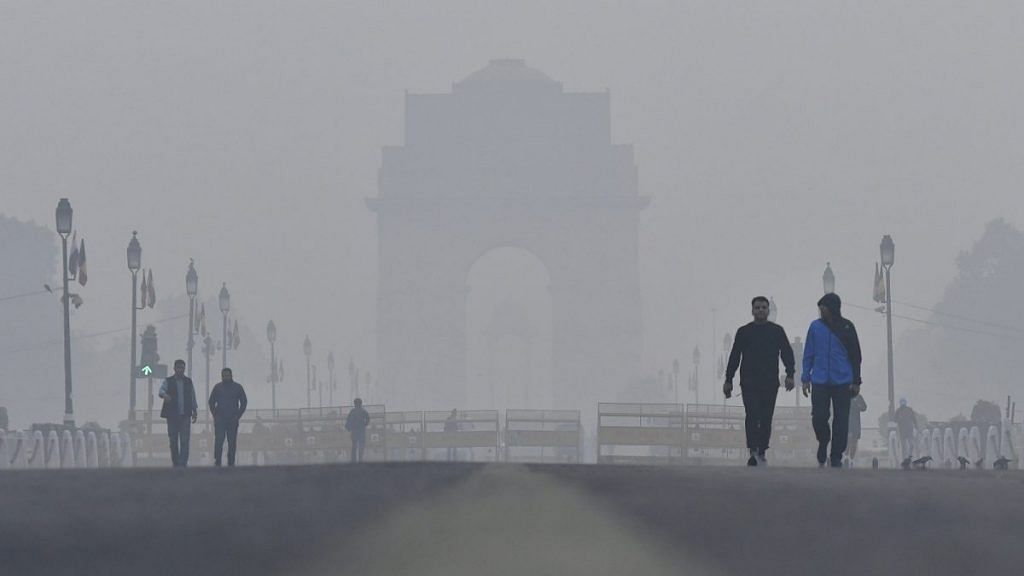New Delhi: “Piquant” pollution, “statutory mockery”, and a whole lot of observations dished out without clearly outlining the underlying rationale.
The Supreme Court’s 17-page order Monday on Delhi’s annual tryst with smog is puzzling for its use of vocabulary and lack of scientific evidence.
For instance, the bench, comprising Justices Arun Mishra and Deepak Gupta, begins the judgment with a reference to pollution as “piquant”.
“Today, everyone is concerned about level of pollution in Delhi and NCR region. This is not something new, every year this kind of piquant situation arises for a substantial period,” the judgment, authored by Justice Arun Mishra, reads.
According to the Oxford English Dictionary, “piquant” means “having a pleasantly strong or spicy taste” and “exciting and interesting”. The example sentence reads thus — “Chicken served with a piquant wild mushroom sauce”.
The court also accused the governments of Punjab, Haryana, Uttar Pradesh and Delhi of making a “statutory mockery”, without referring to any laws to invoke their liability.
Also read: Why judiciary steps in to solve India’s air pollution crisis every time & why it’s not enough
‘Skewed sense of priorities’
The Supreme Court weighed in on the pollution crisis after Delhi and parts of the National Capital Region (NCR) experienced a weekend of deep smog that reduced visibility to zero in many places.
For this, the bench took up the 1985 MC Mehta v Union of India case, better known as the Delhi vehicular pollution matter.
Since the 1990s, the court has, through this case, ordered the phasing out of leaded fuel, introduction of pre-mixed fuels for two-stroke-engine vehicles (like old two-wheelers), removal of commercial vehicles that are 15 years or older, and switching of all commercial public transport vehicles from diesel or petrol to Compressed Natural Gas (CNG).
In specific reference to this case, the court has often been accused of having a “skewed sense of priorities” and being lax in implementing the hoard of orders it has issued over the past three decades.
Also read: 3 out of 10 lung cancer patients in India are non-smokers, doctors blame pollution
‘Piquant’ pollution, ‘statutory mockery’
One particularly controversial aspect of the order is its criticism of farmers in Punjab and Haryana, who are believed to worsen the capital’s situation by choosing to burn the stubble left behind after crops are harvested.
The judgment states that it’s time to fix accountability “for this kind of situation which has arisen and is destroying right to life itself in gross violation of Article 21 of the Constitution of India”.
It then adds, “No farmer can be said to be having a right under the guise that he is not having sufficient time to use the stubble for the purpose of manure, since they have less time between two crops, cutting and sowing of next crop. As such, they cannot by burning it in their fields, put life of sizeable population in jeopardy.”
This observation was made without any farmer being heard, and in the absence of any analysis on the liability that rests on them.
Delhi-based lawyer Gautam Bhatia questioned the court’s wisdom in issuing such an observation without even hearing farmers out.
“The Supreme Court is not emperor Jahangir, dispensing ‘swift and brutal justice’ whenever someone rings his golden bell, however much that vision might appeal to public imagination,” Bhatia wrote on his blog Tuesday.
“Stubble burning does not happen because farmers just love being surrounded by all that smoke and fire — but rather, it is an economic compulsion closely linked to structural questions of livelihood,” he added.
Farmers of Punjab and Haryana claim that burning the stubble is the most cost-effective and quick fix to prepare their fields for the next crop season, and delays are something they can’t afford.
The court also directed every sarpanch to prepare an “inventory” of people who burnt stubble in their fields.
‘Publicity through drum beats’
The court did refer to one report, submitted by the Ministry of Environment and Forest, noting that the factors responsible for pollution include construction and demolition, open garbage dumping, unpaved roads, road dust, garbage burning and traffic congestion.
While many of its observations took these factors into account, some did not refer to any scientific evidence or study and were delivered in a void of context.
For instance, it noted that generator use in some states contributed to pollution. So, it directed state governments and the Delhi administration to “ensure that electricity is not cut so that generators are not used and let no generators be used till next date of hearing except in emergency/healthcare services”.
It is a known fact that many generators are run on diesel, and there are studies pointing to their role in increasing pollution, but the court failed to cite any.
This stands out because Supreme Court judgments are generally exhaustive documents that outline the various aspects of a case before observations are summed up towards the end.
The order then referred to the suggestion of an “IIT expert” regarding the appropriate pressure for water sprinklers. Without mentioning the advice or the name of this expert, it ordered municipal corporations to act on it.
Towards the end of the order, the court said it was fixing liability for inaction at the ground level and ordered the “widest publicity” through television, media, newspapers, radio, and “beat of drums also and other modes to ensure that villagers are made aware of their responsibility and liability towards the other humans so that they do not involve in such acts”.
Also read: Delhi pollution crisis turns into political issue, and it’s not good news for Kejriwal
